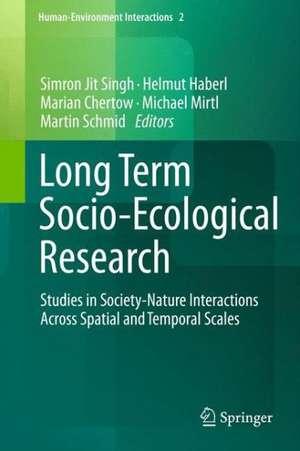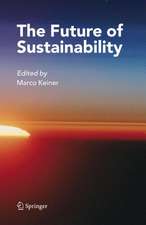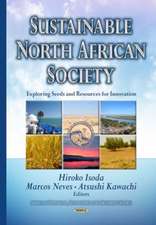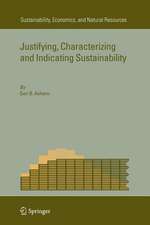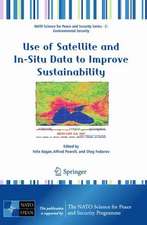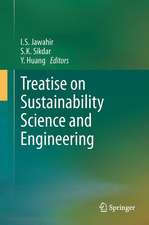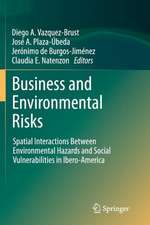Long Term Socio-Ecological Research: Studies in Society-Nature Interactions Across Spatial and Temporal Scales: Human-Environment Interactions, cartea 2
Editat de Simron Jit Singh, Helmut Haberl, Marian Chertow, Michael Mirtl, Martin Schmiden Limba Engleză Hardback – 12 noi 2012
| Toate formatele și edițiile | Preț | Express |
|---|---|---|
| Paperback (1) | 960.13 lei 6-8 săpt. | |
| SPRINGER NETHERLANDS – 14 dec 2014 | 960.13 lei 6-8 săpt. | |
| Hardback (1) | 977.34 lei 6-8 săpt. | |
| SPRINGER NETHERLANDS – 12 noi 2012 | 977.34 lei 6-8 săpt. |
Preț: 977.34 lei
Preț vechi: 1191.88 lei
-18% Nou
Puncte Express: 1466
Preț estimativ în valută:
187.01€ • 195.96$ • 154.60£
187.01€ • 195.96$ • 154.60£
Carte tipărită la comandă
Livrare economică 11-25 aprilie
Preluare comenzi: 021 569.72.76
Specificații
ISBN-13: 9789400711761
ISBN-10: 940071176X
Pagini: 628
Ilustrații: XXXVIII, 590 p.
Dimensiuni: 155 x 235 x 39 mm
Greutate: 1.36 kg
Ediția:2013
Editura: SPRINGER NETHERLANDS
Colecția Springer
Seria Human-Environment Interactions
Locul publicării:Dordrecht, Netherlands
ISBN-10: 940071176X
Pagini: 628
Ilustrații: XXXVIII, 590 p.
Dimensiuni: 155 x 235 x 39 mm
Greutate: 1.36 kg
Ediția:2013
Editura: SPRINGER NETHERLANDS
Colecția Springer
Seria Human-Environment Interactions
Locul publicării:Dordrecht, Netherlands
Public țintă
ResearchCuprins
Foreword 1 (Wolfgang Cramer and Steve Carpenter).- Foreword 2 (Donald Worster).- 1. Introduction. Long-Term Socio-Ecological Research: Scope and History.- PART I: LTSER Concepts, Methods and Linkages.- 2. Sociometabolic Transitions and the Human Appropriation of Net Primary Production: What Promise Do They Hold For LTSER?- 3. Integrated Socio-Ecological Modeling: Experiences From European LTSER Platforms.- 4. Modeling Transport as a Key Constraint to Urbanization in Pre-Industrial Societies.- 5. The Environmental History of the Danube River Basin as an Issue of Long-Term Socio-Ecological Research.- 6. The Relevance of ‘Critical Scales’ For LTSER.- 7. Biohistory.- 8. Geographic Approaches to LTSER: Principal Themes And Concepts With a Case Study of Andes-Amazon Watersheds.- 9. The Contribution of Anthropology To Concepts Guiding LTSER Research.- PART II: LTSER Applications Across Ecosystems, Time and Space.- 10. Viewing the Urban Socio-Ecological System Through a Sustainability Lens: Lessons and Prospects From the Central Arizona-Phoenix LTER Program.- 11. A City and Its Hinterland: Vienna’s Energy Metabolism 1800-2006.- 12. Sustaining Agricultural Systems in the Old and New Worlds: A Long-Term Socio-Ecological Comparison.- 13. How Material and Energy Flows Change Human Practices and Environments: The Transformation of Agriculture in the Eisenwurzen Region, 1860-2000.- 14. The Intimacy of Human-Nature Interactions on Islands.- 15. Global Socio-Metabolic Transitions.- PART III: LTSER Formations and the Transdisciplinary Challenge.- 16. Building an Urban LTSER: The Case of the Baltimore Ecosystem Study and the D.C. / B.C. ULTRA-Ex Project.- 17. Development of LTSER Platforms in LTER-Europe: Challenges and Experiences in Implementing Place-Based Long-Term Socio-Ecological Research in Selected Regions.- 18. Developing Socio-Ecological Research in Finland: Challenges and Progress Towards a Thriving LTSER Network.- 19. The Eisenwurzen LTSER Platform(Austria) - Implementation and Services.- 20. Fostering Research Into Coupled Long-Term Dynamics of Climate, Land Use, Ecosystems and Ecosystem Services in the Central French Alps.- 21. Long-Term Socio-Ecological Research in Mountain Regions: Perspectives From the Tyrolean Alps.- 22. Experiences From the Ötztal Valley in the Tyrolean High Alps: The Transdisciplinary Challenge.- 23. Conclusions.- Index.
Notă biografică
Over the last half century, exceptional changes in the natural environment attributed to human activities have placed renewed importance on the study of society-nature interactions. Around the globe, ever increasing human demands on ecosystems not only harm the environment, but also induce great potential for social conflict. In this sense sustainability problems are not only “ecological” but also “socio-ecological” since the ways societies interact with the environment affects both ecosystems and social systems.
The emerging interdisciplinary field of Long-Term Socio-Ecological Research (LTSER) is primarily concerned with questions of global environmental change and sustainability. It aims to conceptualise, observe, analyse, and model changes in coupled socio-ecological (or human-environment) systems over one to several generations. Tracking these dynamics and changes in socio-ecological systems over extended periods is accomplished in research traditions that include social and human ecology, industrial ecology, environmental history, human geography and anthropology. In recognising research that takes a long-term perspective on society–nature interactions, conceptually and empirically, as well as approaches that engage society in this quest, LTSER aims to provide a knowledge base that helps reorient socio-economic trajectories towards more sustainable pathways.
The authors in this volume make a case for LTSER’s potential in providing insights, knowledge and experience necessary for a sustainability transition. This expertly edited selection of contributions from Europe and North America reviews the development of LTSER since its inception and assesses its current state, which has evolved to recognize the value of formulating solutions to the host of ecological threats we face. Through many case studies, this book gives the reader a greater sense of where we are and what still needs to be done to engage in and make meaning fromlong-term, place-based and cross-disciplinary engagements with socio-ecological systems.
The emerging interdisciplinary field of Long-Term Socio-Ecological Research (LTSER) is primarily concerned with questions of global environmental change and sustainability. It aims to conceptualise, observe, analyse, and model changes in coupled socio-ecological (or human-environment) systems over one to several generations. Tracking these dynamics and changes in socio-ecological systems over extended periods is accomplished in research traditions that include social and human ecology, industrial ecology, environmental history, human geography and anthropology. In recognising research that takes a long-term perspective on society–nature interactions, conceptually and empirically, as well as approaches that engage society in this quest, LTSER aims to provide a knowledge base that helps reorient socio-economic trajectories towards more sustainable pathways.
The authors in this volume make a case for LTSER’s potential in providing insights, knowledge and experience necessary for a sustainability transition. This expertly edited selection of contributions from Europe and North America reviews the development of LTSER since its inception and assesses its current state, which has evolved to recognize the value of formulating solutions to the host of ecological threats we face. Through many case studies, this book gives the reader a greater sense of where we are and what still needs to be done to engage in and make meaning fromlong-term, place-based and cross-disciplinary engagements with socio-ecological systems.
Caracteristici
Traces the developing bonds between ecology and a range of other disciplines Includes analysis of numerous case studies varying widely in location and time Features in-depth research spanning several fields of socio-ecological inquiry
